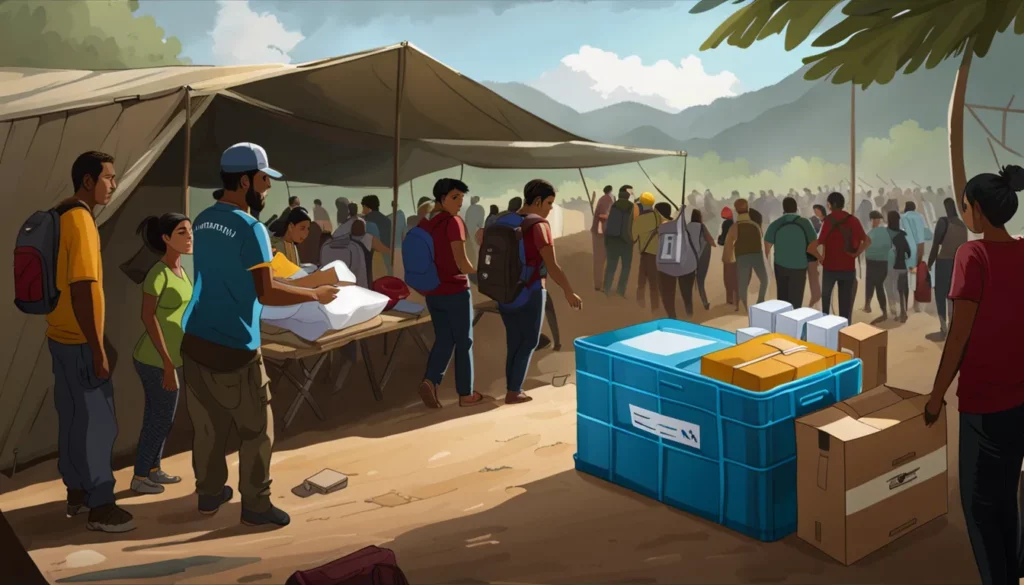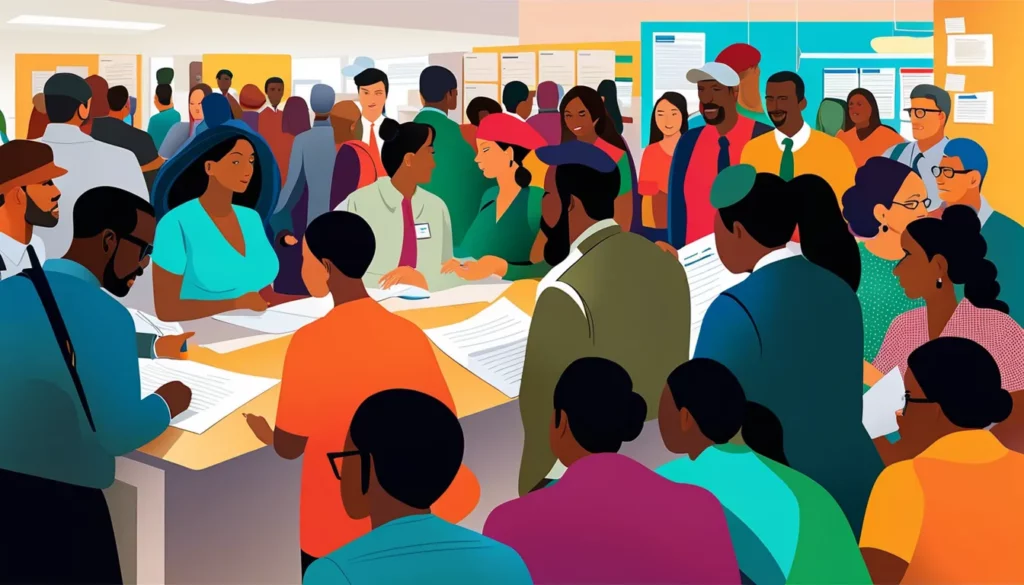What is the humanitarian parole for Venezuelans all about, many people ask. The crisis in Venezuela has left many citizens facing insurmountable challenges. In the midst of this storm, this resource stands as a way to escape instability and find a new beginning.
In recent years, this migratory resource has gained significant attention and importance. For this reason, in this article, Jaskot Law will explain in detail what the humanitarian parole for Venezuelans is about so that you are well-informed.
What is the humanitarian parole for Venezuelans?
Humanitarian Parole provides temporary entry for those facing humanitarian crises, such as political unrest and persecution in countries like Venezuela. Its objective is to offer refuge to those who cannot otherwise immigrate due to urgent and dangerous situations.
In other words, it is a compassionate and supportive response to crisis situations around the world. It is important to note that humanitarian parole does not grant permanent immigration status, nor does it automatically lead to obtaining a Green Card or U.S. citizenship.

Eligibility Criteria for Humanitarian Parole
To access the humanitarian parole for Venezuelans, it is essential to comply with certain specific requirements. Among the most important are:
- Demonstrating a compelling humanitarian need.
- Being a Venezuelan citizen.
- Not having previously obtained an immigrant visa.
- Not being eligible for other immigration categories.
- Having a sponsor in the United States.
- Providing documentation to support the request.
Now that you know what the humanitarian parole for Venezuelans is all about, make sure you are eligible to access the resource and a new life in the United States. Contact Jaskot Law, and its team will guide you step by step.
The Role of the Sponsor
The requirement of having a sponsor in the United States is essential for the application for humanitarian parole. The sponsor is a person or entity that commits to support the Venezuelan applicant during his or her stay in the United States and to provide financial and logistical support.
Who can be a sponsor?
The sponsor may be a U.S. citizen, a lawful permanent resident (Green Card holder), or a legally recognized organization in the United States. It is essential that the sponsor has the capacity and resources to support the applicant and meet financial and legal obligations.
Sponsor procurement process
To obtain a sponsor, the Venezuelan applicant must find a person or entity willing to assume this role. The sponsor must complete and submit the Form I-134, Affidavit of Economic Sponsorship, to the U.S. Citizenship and Immigration Services (USCIS). This form is proof that the sponsor has the financial means to support the applicant.
Humanitarian parole benefits for Venezuelan citizens
Before embarking on the application process, it is essential to understand the benefits of humanitarian parole for Venezuelans. Some of them are:
| Benefit | Description |
| Temporary entry to the U.S. | It allows Venezuelans to temporarily enter the United States to seek refuge. |
| Relief from political instability | It offers an escape from the political turmoil and persecution in Venezuela. |
| Protection against violence | It provides security for applicants facing threats of violence in their home country. |
| Possibility of seeking asylum | Applicants may explore asylum options while in the United States. |
| Opportunity for a new beginning | It opens the door to a better and more secure life for Venezuelans who qualify. |

Humanitarian parole application process for Venezuelan nationals
The application process for this immigration program for Venezuelans is a crucial and detailed step that requires meticulous planning. Below, there is a breakdown of the process into its key components:
| Collection of Documents: Gather all necessary documentation supporting the humanitarian need, such as evidence of the situation in Venezuela and any threat to personal safety. |
| 2. Application Form: Complete the specific application form for humanitarian parole, in which you must provide accurate and detailed information. |
| Selection of the Sponsor: Find a sponsor in the United States that meets the legal and financial requirements. |
| 4. Financial Sponsorship Affidavit Form: The sponsor must complete Form I-134 and file it with the USCIS. |
| 5. Payment of Fees: Pay the appropriate application fee according to the instructions provided by the USCIS. |
| 6. Submission of the Application: Send the completed application, along with all supporting documents and proof of fee payment, to the USCIS. |
| 7. Interview (if necessary): In some cases, an interview may be required to evaluate the application. If an interview is scheduled, applicants should prepare adequately and provide honest and accurate answers. |
| 8. Follow-up: After submitting the application, follow up regularly to learn the status of the process and respond to any additional requests from USCIS. |
This process can seem overwhelming and exhausting, which is why Jaskot Law always recommends that applicants consult with immigration law specialists to answer any questions that arise. We can do it!
What other options do Venezuelans have to immigrate to the United States?
While humanitarian parole is a valuable resource, other options are also available. It should be noted that some programs and options were created exclusively for Venezuelan citizens, while others are general U.S. immigration options.
Options only for Venezuelans
Temporary Protected Status (TPS): In response to the situation in Venezuela, the U.S. government has granted TPS to eligible Venezuelan citizens. This allows for temporary stay and legal work in the US.
General Options
- Non-Immigrant Visa (B1/B2): For temporary travel for tourism, business or medical treatment.
- Work Visa (H-1B): For professionals with U.S. employers.
- Student Visa (F-1): For students who wish to study in U.S. educational institutions.
- Fiancé(e) Visa (K-1): For foreign fiancé(e) of U.S. citizens.
- Investor Visa (EB-5): For investors who wish to create employment in the U.S.
- Political Asylum: For those facing persecution in their country of origin.
- Family Reunification (F2A/F2B): For immediate family members of U.S. citizens or lawful permanent residents.
Conclusion
What is the humanitarian parole for Venezuelans about, then? In short, this immigration remedy represents a ray of hope for Venezuelans facing difficult circumstances in their homeland. It offers the possibility of temporary refuge in the United States and provides relief from political turmoil and economic instability.
Although it is not a guaranteed path to permanent residency, it serves as a lifeline for those in urgent need. If you still have questions on the subject, don’t worry, the team of specialized lawyers at Jaskot Law is able to solve all your doubts and obtain positive results.
Sources
Form I-134, Affidavit of Financial Sponsorship
Temporary Protected Status (TPS)
Frequently Asked Questions
How long does the humanitarian parole for Venezuelans last?
Humanitarian parole is typically granted for a specific period, often on a case-by-case basis. The duration depends on individual circumstances and the urgency of the situation.
Can humanitarian parole lead to permanent residency?
Humanitarian parole is temporary in nature, and does not automatically lead to permanent residency. However, individuals who have received parole may explore other immigration options while in the United States.
Is there a fee to apply for humanitarian parole?
Yes, there is a fee associated with applying for humanitarian parole. It is essential to verify the current fee structure and payment methods when submitting your application.
How long does the application process take?
The processing time of requests for this resource may vary depending on the complexity of the case. It is advisable to submit the application as early as possible to allow for a thorough review and consideration.
Are there any travel restrictions with the humanitarian parole?
Individuals accessing this humanitarian program may travel within the United States during the parole period. However, leaving the country may require additional authorization and re-entry must be carefully planned.
Kemel stands out as a professional in writing and translating content for the Latin American market. With more than four years of experience, he began his professional career as a member of a research group, with which they dealt with various topics and wrote several scientific papers.


